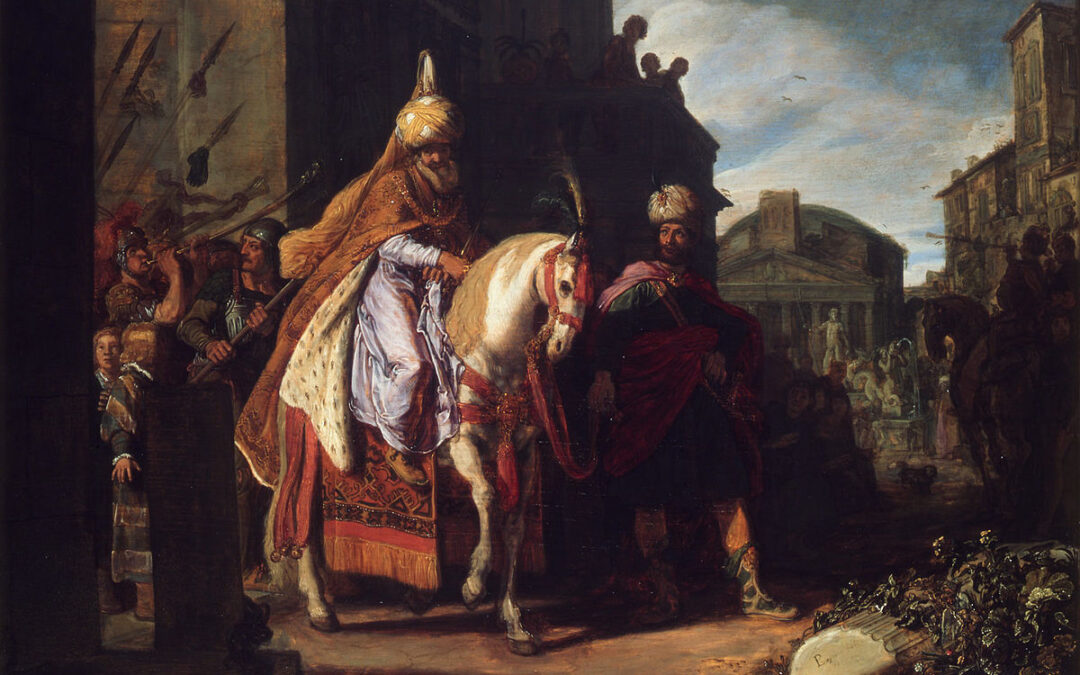KJV Esther 10:2 “The declaration of the greatness of Mordecai …”
NASB Esther 10:2 “The full account of the greatness of Mordecai …”
The Man in The Gate
The book of Esther has proved a fascination to Bible students through the centuries. The providential hand of God is so evident even though His Name is absent. The two biographies highlighted in the book are those of Esther the Queen and Mordecai, her cousin. Each is worthy of our consideration, although we will focus on Mordecai and his resemblance to another Deliverer.
The history of the Nation has been the constant peril it has faced from Hamans, Herods, Hitlers and Husseins (and now from Hamas). Yet out of all of them, the Lord has delivered them. His instrument for that deliverance has varied according to His wisdom. Here, faced with the extinction of the Jews by Haman, God used a heathen king, a Jewish queen, and a man named Mordecai.
The intrigue and plotting of Haman is well-known to all of us. The naïve King, beguiled by the deceitful Haman, signs the decree, and the edict goes forth to slaughter the Jews wherever they are found.
Though the imminent danger appears to be the loss of life for many of the Jews, please recognize that behind the obvious is the more sinister and evil plot of Satan to hinder the coming of the “Seed” of the woman.

Mordecai responded to the threat facing the Nation by donning sackcloth and ashes, sitting in the King’s gate, and mourning the decree. He is a man of sorrows, weeping over the plight of his people. You cannot read this without thinking of another, not draped in sackcloth and ashes but moved by a far deeper sorrow and a far more intense mourning. The Man of Sorrows wept over the city, knowing its approaching doom.
The Man and the Gallows
Haman’s malevolent and devious plotting, motivated by his hatred toward Mordecai, led to a gallows being erected for Mordecai. With his hellish glee, Haman anticipated seeing his nemesis hanged from the “tree.” Once again, the providence of God thwarted the enemy’s plan, and Mordecai was not hung from the gallows. He was delivered.
But another, the Lord Jesus, did not escape the tree. He did not seek to escape it, nor was it in the will of God to deliver Him. That from which Mordecai was preserved was that to which the Lord Jesus was delivered. “Whom ye slew and hanged on a tree” (Acts 5:30). Just as Isaac was delivered from the altar on a mountain in Moriah, so Mordecai was delivered from the gallows in Shushan.
The Man and His Greatness
As the story of Esther closes, we find the man who was the man in the gate, the man on the gallows, now sitting in the government of the Nation. He has been exalted and made very high. His concerns are twofold: he is concerned for the wealth of his people and for their peace. He used his glory and honour for the good of others.
In this final picture afforded us of Mordecai ere the book closes, we are again reminded of one greater than Mordecai. We applaud the selfless administration of the man in the gate. But we worship the Man in the glory. He has passed through death, been raised, ascended and enthroned. Amidst His glory, He is not only seeking our wealth but has assured us of it. He is not only seeking our peace but has also procured it. Mordecai risked his life to be a blessing to his people. Christ gave His life to be a blessing to all humanity. Mordecai brought temporal blessings to his people; Christ has brought eternal blessings to His own.
Consider:
Try to see how every deliverer, especially those in the Judges, resembles the Lord Jesus in some small manner.

